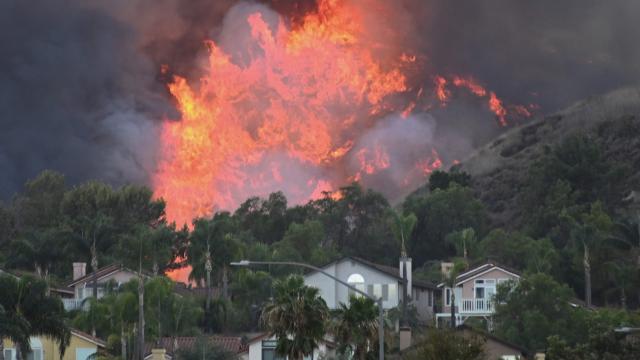I had a brief glimmer of hope and cognitive dissonance when a few images from Fox News crossed my screen last night. Polling by the conservative cable network showed 72% of voters were concerned about climate change and 70% wanted increased federal clean energy spending. It aligns with other polling similarly showing the majority of Americans are worried and want the government to act.
If a clear majority of Americans want to address climate change, why did so many vote in politicians who will make that virtually impossible?
There are clearly some caveats to why the hoped-for climate election didn’t deliver. Chief among them is the minoritarian politics of the U.S. thanks to the warping effect of the Electoral College, gerrymandering, and a Senate where Republicans control the majority despite representing less than 50% of the population. The U.S. is also a hellscape of voter suppression laser-focused on depressing Black and brown turnout, two groups that support climate action more than the general population. This year has also seen a pandemic raging out of control and the economy circling the toilet due to widespread Republican malfeasance. The conditions around this election are uniquely horrifying. While the climate is certainly tied to the coronavirus and how we recover, voters mostly appeared to ignore that, instead focusing their votes on either containing the pandemic or the economy — both of which are also intimately connected to climate change. Nearly three-quarters of Biden voters did say climate was a high priority, so there’s a glimmer of hope some folks got it. But not enough did.
[referenced id=”1517392″ url=”https://gizmodo.com.au/2020/10/the-key-to-passing-good-climate-policy-is-having-real-people-in-congress/” thumb=”https://gizmodo.com.au/wp-content/uploads/2020/10/08/jqjkygv4cl4jalohyhut-300×169.jpg” title=”The Key to Passing Good Climate Policy Is Having Real People in U.S. Congress” excerpt=”Earlier this week, Rep. Alexandria Ocasio-Cortez featured Taco Mix, objectively the best taco spot in Spanish Harlem, on her Instagram. I tell you this to a) convince you to go there if you are ever in the area, and b) because it speaks to the value of representatives who are…”]
If the past two decades have established anything, it’s that there is only one party remotely serious about climate change. (That party is the Democrats, for the record.) Despite that polling and the climate chaos of this year, as of Wednesday afternoon, we’re looking at the potential for a marginal Electoral College win for Joe Biden (absent Republican attempts to stop the vote count) and a Republican-controlled Senate. In that scenario, the avenues for climate policy are there but Not Great! But the fractured federal government and Republican gains in the House and in key races in fossil fuel states like Texas show we’re a ways away from voters truly understanding the stakes of the climate crisis even as time dwindles to address it.
The enormity of the climate crisis has always made it tough to grasp, let alone convince people they should care. The cause is a global economy built to run on fossil fuels. The source of the changes are invisible gases, and while the impacts of a warming planet are increasingly clear, many of the metrics we use to measure it are not. (Nobody, for example, experiences the global average temperature.) The impacts are also not linear; the suffering today is driven by decades of carbon pollution piling up in the atmosphere, and if all emissions stopped today, the impacts would linger for a century or more as the planet adjusts to a new equilibrium. Likewise, the scale of what needs to change is everything. While policymakers have invoked the space race or World War II to put the scale into perspective, there is simply no straightforward comparison to what has to happen to avoid catastrophic warming.
Each year we delay addressing climate change means decades more suffering for millions around the world. It means billions of dollars in damage foisted on people. The cost of inaction far outweighs the cost of action, and yet this year’s election where climate change played a central role through the Democratic primaries down to Biden’s closing message has resulted in an outcome that will yield modest climate benefits at best and utter gridlock at worst. If gridlock does ensue, it also sets the stage for the reactionary right to gain power in the midterms and possibly four years down the road as well, setting the world up on a date with doom.
There has also been a seductively simple and false counter narrative: Climate change is not real, and you can continue to live your life, no adjustments needed. Concocted by the very companies poisoning the planet, it’s made inaction a defining feature of conservative politics for decades. And though voters say they are now more concerned than ever and ready to go big on climate, the politicians they get to choose from are hewn from cloth closer to the CEOs than the average voter and less likely to rock the boat. It’s no surprise the politicians that speak the clearest about climate change and are pushing for needed policies are those who come from everyday backgrounds.
There’s a lot in the way to getting people to vote, with climate change in mind, for candidates who will meet the scale of the crisis. Some of that is continuing to aim a sandblaster squarely at decades of climate denial and the people who used it to maintain power. But it’s also about getting people to understand the enormous cost of inaction and the excitement of building something new. I teach a course on trends in the climate field, and one thing I like to remind my students of is that they have the power to set a new narrative because nothing has worked. The 2020 election results show there’s still work to be to hone it along with people’s ability to imagine a better society that’s sustainably built to last.
